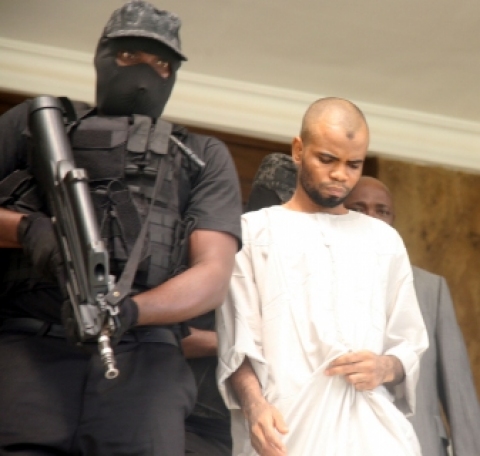A Nigerian Federal High Court has sentenced a member of Boko Haram’s shura council to life imprisonment.
Kabiru Umar, also known as Kabiru Sokoto, was found guilty of planning the 2011 Christmas Day bombing in Niger state. He was also found guilty of having prior knowledge of the attack, and failing to notify the authorities.
His trial has come amidst a Human Rights Commission investigation into rights abuses and illegal detention centers used by the government to imprison suspected Boko Haram members, who some believe are held arbitrarily and in violation of the law.
According to one witness, himself a captive, Kabiru Umar was the highest-ranking Boko Haram member in Sokoto state and provided logistical help and materiel for an attack on a police station.
Umar was initially arrested on Jan. 14, 2012, but caused an uproar in Nigeria when he escaped from police custody, and a bounty of $310,000 was offered for information leading to his recapture.
The suspicious nature of his escape – a police vehicle came under fire while escorting him from their headquarters to his house outside Abuja to conduct a search – led to the dismissal of the head of Nigeria’s police force, Hafiz Ringim, and six of his deputies. Umar was recaptured on March 10, 2012, in Taraba state, near Nigeria’s border with Chad.
Between 2007 and 2012, Umar was involved in terrorism acts in Sokoto, including planting bombs at police headquarters and other government institutions throughout the state.
In 2011, at least 37 people were killed during morning Mass at the Saint Theresa Catholic Church in Madalla, near Abuja, when a car laden with explosives rammed into the gates of the church. At least three other people died in four separate bomb attacks in Nigeria that day.
Umar was also found guilty of training over 500 men in the manufacture and use of improvised explosive devices (IEDs), with the stated aim of attacking government facilities in Sokoto. For this offense, Umar received an additional 10 years, to be served in addition to his life sentence.
According to the judge, Umar showed no remorse throughout the trial.
Are you a dedicated reader of FDD's Long War Journal? Has our research benefitted you or your team over the years? Support our independent reporting and analysis today by considering a one-time or monthly donation. Thanks for reading! You can make a tax-deductible donation here.








